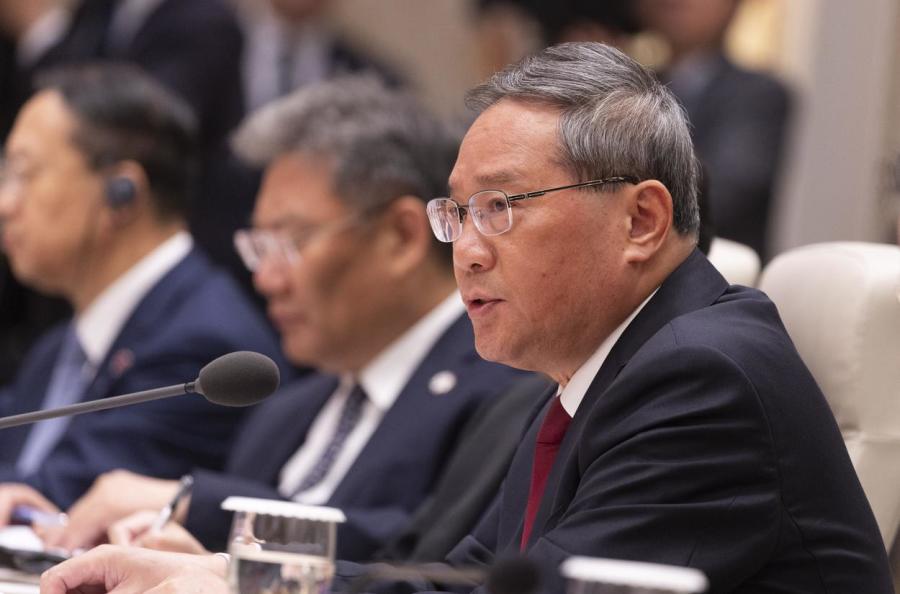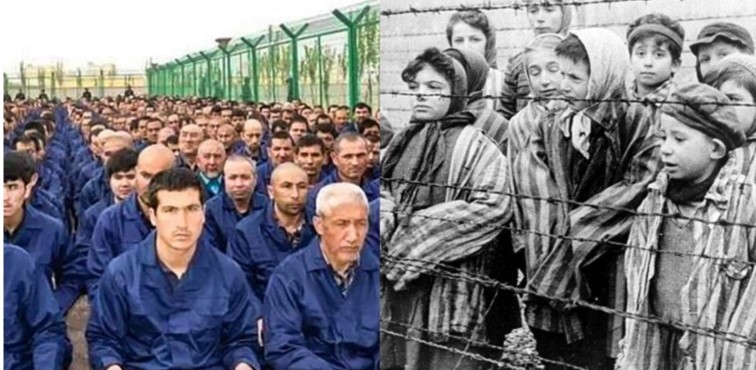The image shows Chinese Premier Li Qiang. (Jeon Heon-kyun - Pool/Getty Images)
[People News] On September 25, the Associated Press published an article titled "China's Xi Takes a Step Back, Putting a Lieutenant in the Limelight at UN Meeting." The article notes that on the occasion of the 80th anniversary of the United Nations, it was expected that Xi Jinping would deliver a speech at the UN General Assembly, but he did not.
Instead, Chinese Premier Li Qiang spoke at this week's annual meeting, marking the latest instance of Xi Jinping reducing his overseas visits and delegating responsibilities to loyal aides. His leadership style appears to be shifting towards a more hands-off approach, while his power remains intact, with Li Qiang assuming a more prominent role in Xi's administration. Could this be further evidence of Xi Jinping's diminishing power?
1. Analysis of Xi Jinping's Absence from the UN General Assembly
Previously, the Chinese Communist Party highlighted that a key piece of evidence for American bullying is the influence of the United States globally. Xi Jinping sought to alter the CCP's influence at the United Nations as part of a strategy to counter America's dominant position. However, his absence from the 80th anniversary meeting of the United Nations has inevitably sparked speculation from observers.
There is speculation that Sino-U.S. relations are currently in a delicate state, with both parties expressing a desire for a meeting between Xi Jinping and Donald Trump. However, this meeting may be premature, as both governments remain deadlocked in trade negotiations, and there appears to be little progress on either side.
Trump has indicated through the media that they will meet at the Asia-Pacific Economic Cooperation summit in South Korea at the end of October, but the Chinese Communist Party has yet to confirm this information.
For Xi Jinping, who has held the title of 'the one' for 13 years, he was enthusiastic about global travel during the first seven years of his leadership. However, since the COVID-19 pandemic outbreak at the end of 2019, he has missed the G20 leaders' summit in India in 2023 and the BRICS summit in Brazil in 2025—this is particularly notable, as the Chinese Communist Party views the BRICS summit as a means to counterbalance U.S. global dominance. It is also unusual that Li Qiang represented the Chinese Communist Party at the 80th anniversary of the United Nations summit.
At the start of his tenure, Xi Jinping was focused on elevating China's international status and role; his current situation may reflect a diplomatic predicament stemming from his support for Russia in its confrontation with the West.
June Teufel Dreyer, a China politics expert at the University of Miami, remarked: 'My guess is... Xi Jinping believes that other countries should come to Beijing, much like envoys from various nations came to pledge their loyalty to the emperor.'
When Li Qiang was appointed as the second-in-command of the state in 2023, Western expectations for him were quite low.
During his time as the Secretary of the Shanghai Municipal Committee, a two-month lockdown due to the COVID-19 pandemic was enforced, which paralyzed the city and sparked protests.
Neil Thomas, a researcher on Chinese politics at the Asia Society Policy Institute, noted that with Xi Jinping's potential departure, Li Qiang could become a key interlocutor for governments and businesses seeking to engage with China. Thomas referred to Li Qiang as "an extremely important figure" who merits engagement. "Li Qiang acts on behalf of Xi Jinping," he stated, "and will be able to relay messages between Xi Jinping and the world."
On Tuesday, Li Qiang announced that China would no longer pursue advantages for developing countries in global trade negotiations, representing a significant shift in policy. Meanwhile, Xi Jinping delivered a video address at the United Nations Climate Change Summit on September 24, where he introduced new climate commitments and outlined China's goals for 2035. Why was Li Qiang not involved in announcing environmental issues?
Thomas believes that Xi Jinping's governance style has evolved, characterising this change as "a more authoritative leadership style" and a "healthier" approach. Some analyses suggest that Xi Jinping's actions do not indicate decentralisation or structural reform; rather, he is simply delegating tasks to others on his behalf.
In contrast to the perspectives of Western media, many Chinese media figures believe that Xi Jinping's power is being challenged and that he is gradually losing influence. However, there was someone who had long foreseen the trajectory of Xi Jinping's governance.
2. Xi Jinping is gradually descending into the abyss.
In 2021, Guo Wengui of the 'New China Federation' predicted in a video that 'Xi Jinping will be the most unfortunate one in the future.' Guo emphasised that while world-class political figures are often backed by powerful international forces, Xi Jinping lacks such support. He elaborated that a shadow government exists globally. Throughout the program, he repeatedly indicated that Wang Qishan's influence and power within the party do not stem from Xi Jinping's elevation but rather from foreign forces, hinting at groups like the 'Freemasons' or 'Illuminati.' In contrast, Russian President Putin is backed by the 'Orthodox Church.'
What implications does this have for Xi Jinping without international support? He will have to choose a dominant ally between the United States and Russia.
Guo Wengui forecasted that if the relationship between the Chinese Communist Party (CCP) and the United States improves in the future, the Communist Party will face immediate extinction. Similarly, if relations with Russia worsen, it will also inevitably lead to its downfall.
The United States and the CCP operate under fundamentally different social systems, making it understandable that there is a desire to prevent the CCP from continuing its dictatorship and to eradicate communism. But why would Russia also seek to eliminate communism?
On May 13, 2025, American scholar Yu Maochun published an article titled 'Diverging Goals Will Tear Apart the Russia-China Alliance,' which highlighted the deep-seated distrust between Putin and Xi Jinping, alongside ongoing geopolitical disputes that erode each other's influence. Moscow perceives that Beijing aims to dominate its position in the Arctic, a concern that has been documented in the CCP's white paper.
Ivan Yu. Zuenko from the Department of Oriental Studies at the Moscow State Institute of International Relations noted in his article 'Russia in Global Affairs' that while China and Russia currently emphasise cooperation, significant contradictions arise from their differing narratives of shared history.
Russian media widely believe that the Chinese Communist Party has minimised the historical support of the former Soviet Union for the early revolution in its records.
Ivan noted that during the 17th and 20th centuries, China and Russia engaged in several wars and conflicts. However, Russia views this history as one where China invaded Tsarist Russia, while the Chinese narrative presents the opposite perspective. This discrepancy has resulted in a territorial dispute between the two nations in 2010, with the Chinese populace believing that Russia has taken their territory, while the Russian side sees it as reclaiming lost land. Concurrently, under Xi Jinping's leadership, the Chinese government has reintroduced the concept of 'national patriotism,' prompting renewed vigilance from Russia.
It is clear that Xi Jinping's ascent to power was quite unexpected; fundamental knowledge that leaders should possess, such as the 'logic behind governance' and 'the significance of religious beliefs,' has not been conveyed to him, allowing him to unwittingly descend into a precarious situation.
Previously, Guo Wengui's predictions regarding Xi were dismissed as rumours by many, but in retrospect, they seem to have been remarkably prescient. Xi Jinping may be feeling pressure from various sources, making him hesitant to venture outside the country, yet he finds himself ensnared in traps that were set for him long ago.
(First published in People News)
△










News magazine bootstrap themes!
I like this themes, fast loading and look profesional
Thank you Carlos!
You're welcome!
Please support me with give positive rating!
Yes Sure!